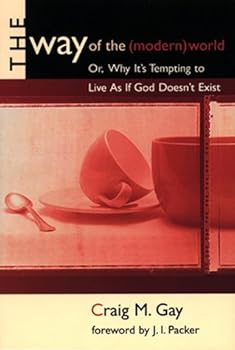The Way of the (Modern) World
Select Format
Select Condition 
Book Overview
Does God really matter for today's Christians? Craig Gay addresses this issue in his The Way of the (Modern) World: Or, Why It's Tempting to Live As If God Doesn't Exist. Gay takes a critical look at... This description may be from another edition of this product.
Format:Paperback
Language:English
ISBN:1573831220
ISBN13:9781573831222
Release Date:January 1998
Publisher:Regent College Publishing
Length:340 Pages
Weight:1.05 lbs.
Customer Reviews
4 ratings
An Outstanding work of Christian Scholarship
Published by Thriftbooks.com User , 20 years ago
This is one of the best and most insightful (and dare I say important?) books I have ever read. It's clarity, depth of insight and profundity have few equals in contemporary scholarship. I am reminded, reading this book, of the first time I ever read Francis Schaeffer's "How Should We Then Live?" This book is equally profound in its insight and implications, but is a much better work of applied scholarship than that one is. Gay's basic premise is that the forces that shape the modern world are not those things we see on the surface, but those hidden assumptions that permeate our understanding of ourselves and our world via modern politics, science and technology, economics, and psychology. Gay argues that these areas are often permeated with subtle "worldly" assumptions which drive our culture in a secular direction and make belief in God seem irrelevant or unrealistic. Not that Gay is against these areas of modern life per se, either. He simply wishes to make his readers aware of the danger in the assumptions that often lie beneath the surface of these areas that can influence us to "live as if God doesn't exist," even if we are professing Christians. The book is extremely well researched and documented, and Gay spends a great deal of time, in each section of the book, setting up the historical factors that contributed to the rise of these worldly assumptions. In each chapter he also talks about the historical relationship between the Christian church and these different facets of modern life and how Protestant Christianity (Gay is a Protestant Christian) is, ironically, partly responsible for the rise of modern secularity. He concludes the book by offering some helpful reflections on how Christians should think and act in the secularized modern world. Even though this book is a first rate work of scholarship, it is very lucidly written, and any intelligent and interested person should be able to follow the basic gist of Gay's argument. This has my highest recomendation.
Faith, Culture and Intentionality.
Published by Thriftbooks.com User , 21 years ago
Craig Gay has penned one of the most penetrating analyses of the mutual reciprocity involved in the interplay between faith and culture. He is especially astute in delineating the subtle effects popular culture has on faith and practice. Even though he analyzes the faith-culture milieu through the lens of Christianity, many of the conclusions he makes are valid whenever faith clashes with the tidal wave of culture, such as we have in the West. This book is the total package, as the author makes suggestions concerning what correctives are needed in order to draw people of faith back from the shores of practical atheism. Of course, these suggestions are consistent with the Christian suppositions he employs throughout. Gay is very thorough in his examination of the instruments-sociology, psychology, theology, anthropology, epistemology, and others- which pop culture has co-opted so deftly in the process of trivializing faith's role in our lives. If you liked Richard Weaver's "Ideas Have Consequences" or Kenneth Myers' "All God's Children and Blue Suede Shoes", you will like this book. Tolle Lege.
Valuable Critique and Challenge for the Modern Minister
Published by Thriftbooks.com User , 23 years ago
Gay does an excellent job summarizing the major problems of worldliness and modernity. He indicates that the issues of modernity involve "control". Science, socio-political issues, technology, and anthropocentrism are about control. This has created a consumer and self-absorbed culture which seeks to control the outcomes of their life, environment, and religious views. Gay indicates that this may be due to the former centuries' emphasis on rationalism. He believes that this rationalism is concerned with achieving predetermined results.How does this affect the Christian? The cultural Christian has focused on self-therapy, religious freedoms, and a fear of commitment to community. The Christian becomes a private, lonely, and isolated individual.Gay's solution is to view the self and culture in relation to the all-powerful God. God has created man in His image and the world as His special revelation. This view of creation, human image, and revelation calls humans to view themselves as part of God, rather than apart from Him. The culture may attempt to control but the Christian allows themself to be controlled by God and realizes that life is about obedience and joy rather than manipulation and lonliness.
Brilliant and incisive critique of post modern world
Published by Thriftbooks.com User , 25 years ago
Wide ranging and delightfully erudite but enlivened with a deft and engaging style, Gay gives fresh insight and thoughtful nuggets on every page as to "why it's tempting to live as if God doesn't matter" For so very long after C. S. Lewis, Christian scholars couldn't seem to put pen to paper without sounding like Jeremiah. Gay--and a few others in recent years--show that there need not be anything scandalous about the "evangelical mind."




